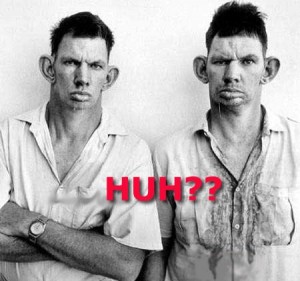 (This is a guest post by Brad Williamson – The Virtual Biographer™)
(This is a guest post by Brad Williamson – The Virtual Biographer™)
Fans want to feel closer to the athletes they admire. If it was up to them, they’d be hanging out over at their house every night, drinking on alcoholic cold snacks and playing Madden ’till the break of day.
Unfortunately, for that harmless little stalker that exists within all of us, that’s just not ever gonna happen.
So what’s the next best approach to digging into the daily drama of our favorite athlete’s day-to-day activities…?
It Sure Ain’t Twitter
Twitter can be useful in a lot of ways, but when it comes to an athlete trying to manifest an intimate relationship with a group of fans who so desperately wanna love on them a little, they end up turning the platform into a big jock tease.
Now I know I called these teasing Twitterer’s “inconsiderate” in this webisode’s title (and maybe that in itself was a bit inconsiderate – sorry, but the truth of the matter is that while they may not realize they’re being insensitive, they’re definitely being just that.
As it stands right now, I’m sure about 99.99999% of athlete Twitterer’s are using the platform because… A. having a googilion Followers feels pretty damn cool; B. they feel out-of-touch for not riding on the micro-blogging bandwagon; or C. someone within their personal management team told them they needed to use it and probably never gave them a good reason as to why.
With that said, it appears that most athlete Twitterer’s – and, really, most public figures within any realm of entertainment – are using the platform without any productive reason.
Naivety Kills Careers
Again, I apologize for calling these people “inconsiderate,” because the reality of the situation is that they’re probably unaware of the social responsibilities their celebrity demands them embrace – after all, they’re athletes, not psychologists. So should we blame them for being a bit naive about the tremendous influence they own over their fans?
For now, no, because we gotta give them a little room to maneuver through the learning curve the social strengths of the Net causes you to wrestle with. However, we’re quickly approaching the completion of the social Web’s training camp and our favorite players need to start realizing that their virtual performances are about to start counting for something significant: the life or death of their public persona. Why? Because, pretty soon, you’re going to be perceived as being publicly irrelevant if you’re not contributing something socially significant within the world’s collective online community.
You’re Doing it Wrong!
 Here’s what celebrity Twitterer’s don’t understand…
Here’s what celebrity Twitterer’s don’t understand…
– Twitter shouldn’t be the centerpiece their virtual identity. They’re lives are extraordinary and 140 character Tweets can’t contain all the details of their days their fans demand that they reveal. They should still use Twitter, because where there’s an audience there’s opportunity, but it needs to be a small piece of a much more comprehensive Virtual Biography.
– Content kills those who don’t understand the power of content. Yes, Twittering your preference of iced Pop Tarts over toastable Pop Tarts is cool when broadcast in moderation, because this type of insight humanizes individuals who typically seem super-human; but if your Twitter stream contains nothing but content devoted towards stuff about your breakfast biases, then you’ll not only lose your audience to boredom, but you’ll also lose the celebrity luster you once had. And once that’s gone, you’ll have a tough time regaining fan’s interest in you as a person when you decide that you want to lead a more meaningful virtual life where you embrace a wider array of online broadcast channels that exist beyond Twitter-dot-friggin’-com.
– Athlete’s Followers really — and I mean REALLY — give a damn about them. Throughout most of their lives, athletes see themselves as someone who’s merely admired for their physical talents and nothing much more meaningful beyond that. Well guess what, you modest muscle-men and women… the media murdered that simple life. Fans now have nightly meetings with you as they watch you perform everyday. And because of this constant interaction with you, they begin to feel as if they have an illusion of an intimate relationship with you, that’s otherwise known as a “parasocial relationship.” So when your fans jump online in an effort to interact with content that came straight from you, it’s really an insult to them that all you bother providing them is 140 characters of substancless blurbs of “blah, blah, blah, Bob Law Blog.”
You’re So Money & You Don’t Even Know It
Imagine the opportunities that would open up for a celebrity who reached out to their fans and really tried to satisfy their hunger for more insight into their life… not only would their fans start to feel like they’re friends of their favorite athlete thanks to the sneak peak they’re providing into their lives, but the monetary rewards for increasing the value of their personal brand would also be tremendous.
But you know what…?
None of those opportunities will ever arise as long as Twitter is a public figure’s primary fan engagement platform. Fans desperately desire for athletes to lead a virtual life that’s every bit as healthy and vibrant as their physical life is, and the only way this energy can be created is if public figures start treating their personal brand as if it’s a full-on media empire that contains literary, video, audio, photographic, interactive and promotional content about their life that’s broadcast throughout the entire Web on a daily basis.
Can Twitter be a part of that virtual media empire? Sure it can. But it better be only one small part of a much larger media effort. And before athletes begin constructing this media empire that’s centered upon their personal brand, they also gotta drop their amateur attitude towards the process and realize that their fans demand more out their relationship with each other than they thought they did.
You thought your girlfriend or boyfriend was needy!? SHOOOOOOOOT…. they don’t have nuthin’ on the separation anxiety a fan of a public figure experiences! So, athletes, stop teasing us with your cute little Tweets and give us something a little more meaty; because, if you don’t, you’re gonna lose our interest in you. And without that, you’re nothin’, buddy 😉
Follow Brad Williamson on FriendFeed, Twitter, LinkedIn, etc. and so forth & so on…
Photo Credit: CuppyGee.Blogspot.com




you are right, twitter or a virtual presence by the athlete or sports person can really build an environment for the fans to connect with the individual. This may also offer brands & endorsements a new property to promote themselves.
@Samraat Brands promoting themselves throughout a public figure’s virtual media empire???
…GetOuttaHere!
That would make way too much sense! They’re really better off just waiting until they reach the Super Bowl so Disney can pay them to say “I’m going to Disney World!”
After all, waiting for that once in a lifetime payday would be way more lucrative than being the star of your own daily broadcast medium about your life that brings in ad cash on the reg.
Thanks for the comment, man 😉
What all athletes using twitter no doubt need is a social marketing expert consultant who can guide them through the critical protocols and complex considerations of writing 140 character messages several times a day.
Russ
I gotta disagree a ‘lil bit with ya, RAH. IMO, they need someone who can consult them AND produce for them the multimedia production that is their virtual life.
The only roadblock that’s more intrusive to a public figure having a healthy and vibrant virtual life than their lack of knowledge on the process is their lack of time to put all the pieces of the production together. To combat this, they need someone who can take the content of their life and then authentically transcribe it into a publishable format that’s then strategically broadcast throughout the entire Net. Then this wide reach of content which came directly from the public figure theirself will ultimately turn their personal brand into a full-on media empire that can actually entertain and engage their audiences on a deeply emotional level.
In a nutshell, RAH… I agree that they need help, but not just on Twitter. They need someone who can take the labor and Web savvy outta the process of creating a soulful virtual identity for themselves. Once this happens, I believe that every public figure will have a virtual identity that’s just as healthy and vibrant as their physical life is. (I don’t mean to toot my own horn, but – BIPPITY-BOPPITY! – I’m pretty confident that I have the blueprint to that solution 😉
Thanks for your comment, Russ!
I agree with RAH with regards to these athletes having access to some sort of social media consultant or communications consultant versed in new media and new digital communicative mediums that can help guide these individuals. I believe there should actually even be a “mandatory” program sponsored by the NFL or the NBA, etc. that promotes and enforces this.
I understand the basis for your comments regarding having someone actually “produce” the content for them across the various social networks, however, this seems to me to take some of the allure or authenticity out of the whole notion of actually getting the goods straight from the horse mouth. If I’m following an athlete on Twitter or as a Fan on Facebook, I want to know that the posts, comments, Twits or whatever are really from the athlete and not some administrative assistant. I think if these men and women athletes really get some “training, education, guidance, whatever” on how to create productive and interesting digital personas, that would definitely improve the present situation.
@David I agree with you that the content has to come straight from the horse’s mouth. Thankfully, there’s definitely a way for someone to help these people broadcast their virtual life while keeping that content authentic on a word for word basis.
As someone who’s working to make this approach to living a virtual life a reality, I wouldn’t have the content feel anything but 100% authentic, because to compromise the integrity of the content is to compromise the trust of the fans, and that simply just can’t happen.